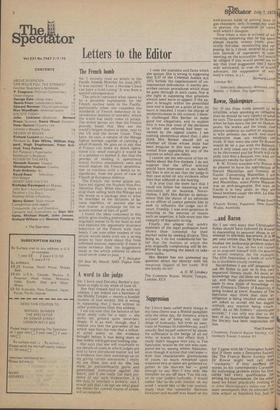A word to the judge
Sir: I have read Dorothy Becker's outburst in reply to my letter of June 16.
Her first remark had to do with my address. I am indeed not a barrister of the Middle Temple — merely a humble student of that society. She is wrong in supposing that .1 have written to other publications from this address.
I am not sure that the balance of her letter really calls for a reply — she shifts her ground quite mind-bendingly. It is as well, though, that I remind you that the gravamen of her article was that the rule that a tribunal acted solely on the evidence brought before it was being more or less widely infringed and nothing else. She says that she will vouchsafe to me details of cases in which judges are said to have introduced matter not led in evidence into their summings-up on my giving certain assurances. I really do not think . this will do. She has made an extraordinarily grave. and generalised insinuation against the bench, and if she really has hard evidence of any such malpractice, it is her duty to ventilate it publicly; and I would add that I do apt see what good she thinks her current course of action will accomplish. I note the statistics and facts which that S.37 of the Criminal Justice Act she quotes. She is wrong in supposing 1972 forbids the imprisonment of unrepresented defendants: it merely prescribes certain procedures which must be gone through in such cases. Nor is 'she right in supposing that prisoners always need leave to appeal: lithe appeal is brought within the prescribed time and is based on a point of law, no leave is required. I reject the charge of tendentiousness in the context. I merely challenged Mrs Becker to make good her allegations, and to explain why it was that none of the decisions to which she referred had been reviewed by the appeal courts. I see nothing tendentious about that. I also think Mrs Becker should tell us whether all those whose trials had been irregular in this way were prevented from appealing by any of the matters to which she refers.
I cannot see the relevance of her reMarks about the five dockers. I do not suppose that the officel solicitor would have intervened on my behalf; but that is not to say that the judge in that case acted on any evidence other than that adduced at the hearing.
It is true that the mere fact that I could not follow her reasoning is not conclusive of its business. Nevertheless, I defy Mrs Becker to demonstrate that the status of an advocate as an officer of justice permits him to seek to influence the judge out--)fcourt. Frankly, I was over-generous in imputing to the exercise of reason such an assertion, it falls more into the. category of dogmatic raving.
Finally, she alleges that sundry members of the .legal profession have shown their contempt for their marital oaths by seeking divorce. This being so, I do not understand her belief that the matters of which she was originally complaining will be improved by requiring the bench to take' more oaths.
Mrs Becker has not answered My question about her identity with the vexatious litigant of her name. Will she kindly do so? A. D. M. Lindsay The Common Room, Middle Temple, London, EC4












































 Previous page
Previous page